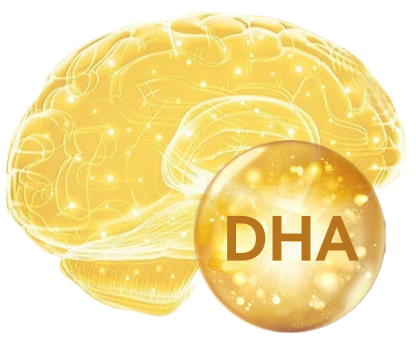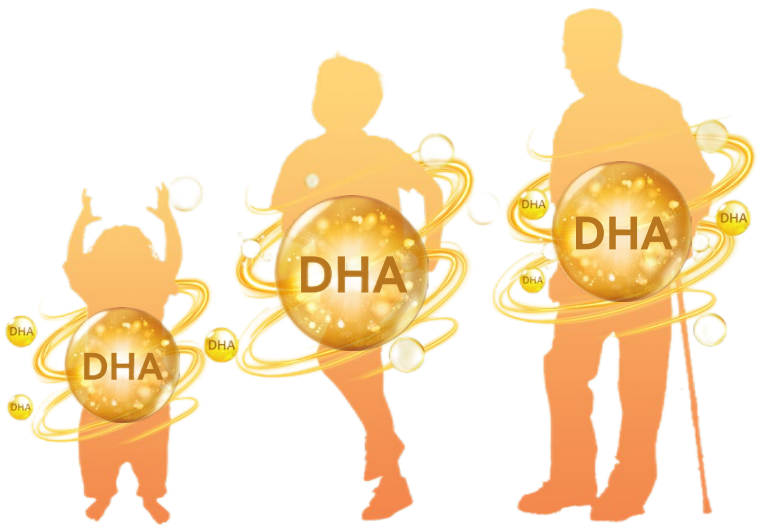What is DHA?
DHA is docosahexaenoic acid, which belongs to the omega-3 polyunsaturated fatty acids (Figure 1). Why is it called an OMEGA-3 polyunsaturated fatty acid? First, its fatty acid chain has 6 unsaturated double bonds; second, OMEGA is the 24th and last Greek letter. Since the last unsaturated double bond in the fatty acid chain is located on the third carbon atom from the methyl end, it is called OMEGA-3, making it an OMEGA-3 polyunsaturated fatty acid.
Distribution and mechanism of DHA
More than half of the weight of the brain stem is lipid, rich in OMEGA-3 polyunsaturated fatty acids, with DHA occupying 90% of OMEGA-3 polyunsaturated fatty acids and 10-20% of the total brain lipids. EPA (eicosapentaenoic acid) and ALA (alpha-linolenic acid) only make up a small part. DHA is the main component of various membrane lipid structures, such as neuronal synapses, endoplasmic reticulum, and mitochondria. In addition, DHA is involved in cell membrane-mediated signal transduction, gene expression, neural oxidative repair, thereby coordinating brain development and function. Therefore, it plays an important role in brain development, neural transmission, memory, cognition, etc. (Weiser et al., 2016 Nutrients).
The photoreceptor cells in the retina’s photosensitive part are rich in polyunsaturated fatty acids, with DHA accounting for over 50% of polyunsaturated fatty acids (Yeboah et al., 2021 Journal of Lipid Research; Calder, 2016 Annals of Nutrition & Metabolism). DHA is the primary component of the major unsaturated fatty acids in photoreceptor cells, participating in the construction of these cells, as well as in mediating visual signal transduction and enhancing cell survival in response to oxidative stress (Swinkels and Baes 2023 Pharmacology & Therapeutics).
DHA and Human Health
The Role of DHA in Brain Development, Cognition, Memory, and Behavioral Emotion
The development of the frontal lobe of the brain is significantly influenced by DHA supply(Goustard-Langelie 1999 Lipids), affecting cognitive ability, including focus, decision-making, as well as human emotion and behavior. Therefore, maintaining high levels of DHA is not only crucial for brain development during pregnancy and adolescence, but also crucial for cognition and behavior in adults. Half of the DHA in an infant’s brain comes from the accumulation of the mother’s DHA during pregnancy, while an infant’s daily intake of DHA is 5 times that of an adult(Bourre, J. Nutr. Health Aging 2006; McNamara et al., Prostaglandins Leukot. Essent. Fat. Acids 2006). It is therefore vital to obtain sufficient DHA during pregnancy and infancy. It is recommended that mothers supplement with 200 mg of DHA per day during pregnancy and breastfeeding(Koletzko et al., J. Perinat. Med.2008; European Food Safety Authority, EFSA J. 2010). Various studies have shown that DHA supplementation during pregnancy increases birth weight and length(Makrides et al, Cochrane Database Syst Rev.2006), while also enhancing cognitive abilities in childhood(Helland et al., Pediatrics 2003).
Supplementing with DHA during breastfeeding enriches gestural language(Meldrum et al., Br. J. Nutr. 2012), enhances infant intellectual development, and increases IQ(Drover et a l.,Early Hum. Dev.2011; Cohen Am. J. Prev. Med. 2005 ). Children supplemented with DHA show improved language learning and spelling abilities(Da lton et a l., Prostaglandins Leukot. Essent. Fat. Acids 2009).
Although the effects of supplementing DHA during adulthood are uncertain, studies among college-aged youth have shown that supplementing DHA for four weeks can enhance learning and memory (Karr et al., Exp. Clin. Psychopharmacol. 2012). In populations with poor memory or loneliness, DHA supplementation can improve episodic memory (Yurko-Mauro et al., PLoS ONE 2015; Jaremka et al., Psychosom. Med. 2014)
Supplementing DHA in older adults helps increase cognitive and memory abilities. Gray matter, located on the outer surface of the brain cortex, supports various cognitive and behavioral activities in the brain, as well as the generation of emotions and consciousness. However, gray matter volume decreases with age, and oxidative stress and inflammation in the nervous and immune systems also increase with age. Research indicates that supplementing DHA can increase or maintain gray matter volume and enhance memory and cognitive abilities (Weiser et al., 2016 Nutrients).
As age advances, memory declines, which can lead to dementia. Other brain pathologies can also lead to Alzheimer’s disease, a form of dementia in the elderly. Several studies suggest that daily supplementation of over 200 milligrams of DHA can improve intellectual development or dementia. Currently, there is no clear evidence for the use of DHA in treating Alzheimer’s disease, but experimental results suggest that DHA supplementation has a certain positive effect in preventing Alzheimer’s disease (Weiser et al., 2016 Nutrients).
DHA and Eye Health
Research in mice has found that a deficiency of retinal DHA, whether due to synthesis or transport reasons, is closely associated with visual impairment. Patients with age-related macular degeneration, diabetes-associated retinopathy, and retinal pigment dystrophies have lower DHA levels in their blood. However, it is still unclear whether this is a cause or a result. Clinical or mouse studies supplementing DHA or other long-chain polyunsaturated fatty acids have not yet led to a clear conclusion (Swinkels and Baes 2023 Pharmacology & Therapeutics). Nevertheless, because the retina is rich in long-chain polyunsaturated fatty acids, with DHA being the main component, DHA is crucial for the normal eye health of humans (Swinkels and Baes 2023 Pharmacology & Therapeutics; Li et al., Food Science & Nutrition).
DHA and Cardiovascular Health
Accumulation of saturated fatty acids is detrimental to cardiovascular health, while unsaturated fatty acids are beneficial. Although there are reports that DHA promotes cardiovascular health, numerous studies also indicate that the effects of DHA on cardiovascular health are not clear. In relative terms, EPA plays an important role (Sherrat et al., Cardiovasc Res 2024). Nevertheless, the American Heart Association recommends that coronary heart disease patients supplement with 1 gram of EPA+DHA daily (Siscovick et al., 2017, Circulation).
Post time: Apr-01-2024


